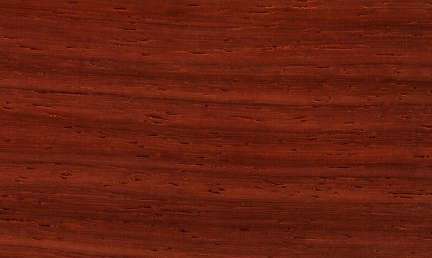 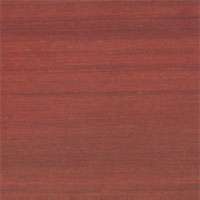 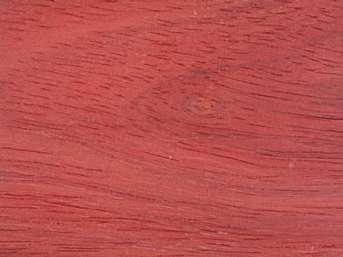 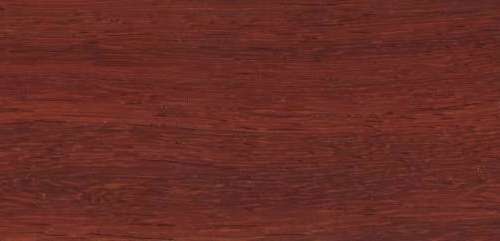 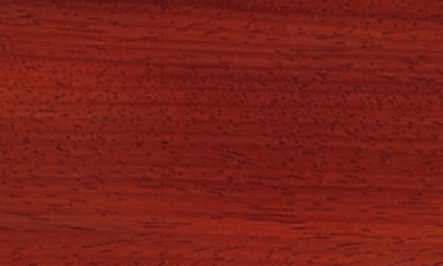 
African padauk (Pterocarpus soyauxii)
Family: Leguminosae
Common names: Africaans padoek, African coral wood, African padauk, Afrik padouk, Afrikanisches korallenholz, Afrikanisches padoik, Akume, Arapka, Ba, Barrwood, Barwood, Bo, Bois corail, Bois de rose, Bois rouge, Bois ulu, Boko, Boku, Bosulu, Bou, Camwood, Corail, Ebeu, Epein, Epion, Escio, Ezigo, Gula, Kisese, Kisesi, Koula, M'bio, Mbe, Mbel, Mbeu, Mbie, Mbil, Mbili, Mohingue, Mongola, Muenge, Mukula, Mututi, N'gola, N'gula, N'kula, Ndimbo, Ngula, Nve, Osun, Ozigo, Padouk, Padouk d'Afrique, Palorojo, Red santal, Redwood, Santal rouge, Tacula, Takula, Tizeze, Uhie, Uhile, Ukpa, Vermillion, Wele, Yomo
Distributed in: Angola, Cameroon, Central African Republic, Congo, Equatorial Guinea, Gabon, Ghana, Nigeria, Zaire (Africa)
Distribution overview: The genus Pterocarpus occurs throughout the tropical regions of the world. P. soyauxii is found in Central and tropical West Africa, extending from south-western Nigeria to Zaire. It often grows in small groups and is common in dense equatorial rain forests.
Common uses: Agricultural implements, Bedroom suites, Boat building (general), Boat building: decking, Bobbins, Boxes and crates, Bridge construction, Cabinetmaking, Canoes, Carvings, Chairs, Chemical derivatives, Chests, Concealed parts (Furniture), Decks, Decorative veneer, Desks, Dining-room furniture, Domestic flooring, Dowell pins, Dowells, Drawer sides, Dyewood , Excelsior, Figured veneer, Fine furniture, Floor lamps, Flooring, Furniture , Furniture components, Furniture squares or stock, Furniture, Handles, Hatracks, Heavy construction, Joinery (external): ground contact, Joinery, Kitchen cabinets, Light construction, Living-room suites, Marine construction, Mine timbers, Musical instruments, Musical instruments: piano, Musical instruments: strings, Oars, Office furniture, Paddles, Parquet flooring, Picker sticks, Plywood, Posts, Radio - stereo - TV cabinets, Railroad ties, Rustic furniture, Shade rollers, Shafts/Handles, Shuttles, Specialty items, Spindles, Sporting Goods, Tool handles, Turnery, Vats, Vehicle parts, Veneer, Veneer: decorative, Wheel spokes, Wheels
Product sources: The ITTO reports that this species is frequent source of timber which is exported in low quantities and only occasionally. African padauk is available in both lumber and veneer forms on the market in North America, but prices are typically in the high range.Availability in long lengths, wide boards, and in veneer form is rather limited on the European market, but prices are comparable to that of the lower cost hardwoods.
Environment profile: Vulnerable in parts of its natural habitat
Tree size: Trunk diameter is 150-200 cm
Colors: the heart isYellow, Yellow to golden-yellow to orangeand the sapwoodWhitish, Yellow.The grain isWavy, the textureUniformand the lusterPronounced
Natural durability: Very durable, Very good weathering properties
Odor: Has an odor
LightInduced Color Change: Darker
Kiln Schedules: UK=J US=T10D5S/T8D4S Fr=4
Kiln Drying Rate: Very slow (>28 days for boards < 32 mm, to >84 days for boards >= 63 mm)
Drying Defects: No twisting or warping, Splitting
Ease of Drying: Thick Stock Requires Care
Tree Identification: Bole/stem form is straight
Comments: Crystal deposits are usually present General finishing qualities are rated as good
Blunting Effect: Little
Boring: Good boring qualities
Carving: Good results
Cutting Resistance: Saw well with slow feed rate
Gluing: Glues very well
Mortising: good
Moulding: Good finishing
Movement in Service: Good finishing
Nailing: Tends to split during nailing, Very Good to Excellent
Planing: Torn grain common in quartersawn material
Resistance to Impregnation: Sapwood is moderately resistant
Response to hand tools: Variable qualities
Routing recessing: Routing is easy
Sanding: Very Good to Excellent Results
Veneering qualities: Veneers easily, Veneers moderately easy
Screwing: Stock in smaller dimensions may split , Very Good to Excellent Results; Turning: Generally good
Painting: Very Good to Excellent; Polishing: Very Good to Excellent; Staining: Wood has a tendency to bleed, water-based finishes recommended ; Varnishing: Very Good to Excellent;
- Numerical data Metric
- Numerical data English
- Strength properties
- References
 |
 |
 |
 |
| Item |
Green |
Dry |
Metric |
| Specific Gravity |
0,6 |
0,68 |
|
| Density |
|
753 |
kg/m3 |
| Bending Strength |
928 |
1263 |
kg/cm2 |
| Crushing Strength |
468 |
618 |
kg/cm2 |
| Hardness |
|
1006 |
kg |
| Impact Strength |
|
|
cm |
| Shearing Strength |
|
109 |
kg/cm2 |
| Stiffness |
113 |
125 |
1000 kg/cm2 |
| Tangential Shrinkage |
5 |
|
% |
| Radial Shrinkage |
3 |
|
% |
| Weight |
721 |
592 |
kg/m3 |
| Maximum Load |
|
|
cm-kg/cm3 |
| Toughness |
|
|
cm-kg |
| Static Bending |
|
|
kg/cm2 |
|
 |  |  |  | | Item | Green | Dry | English | | Bending Strength | 13206 | 17976 | psi | | Density | | 47 | lbs/ft3 | | Hardness | | 2219 | lbs | | Maximum Crushing Strength | 6670 | 8794 | psi | | Shearing Strength | | 1560 | psi | | Stiffness | 1608 | 1792 | 1000 psi | | Specific Gravity | 0.6 | 0.68 | | | Weight | 45 | 37 | lbs/ft3 | | Radial Shrinkage | 3 | | % | | Tangential Shrinkage | 5 | | % | | Volumetric Shrinkage | 8 | | % | |
Density (dry weight) = 46-52 lbs/cu. ft. 0
Max. crushing strength = high 0
Bending strength (MOR) = high 0
Density (dry weight) = 53-60 lbs/cu. ft. 1
Shrinkage, Tangential = very small
Shrinkage, Radial = small
Hardness (side grain) = hard
Density (dry weight) = 38-45 lbs/cu. ft.
Shrinkage, Tangential = small
Shrinkage, Radial = very small
Bending strength (MOR) = medium
Modulus of Elasticity (stiffness) = medium
Hardness (side grain) = very hard
Modulus of Elasticity (stiffness) = low
Modulus of Elasticity (stiffness) = high
Shrinkage, Tangential = fairly large
Shearing strength (parallel to grain) = low
Hardness (side grain) = soft
Hardness (side grain) = medium
Density (dry weight) = 23-30 lbs/cu. ft.
Bending strength (MOR) = very high
Shrinkage, Tangential = moderate
Shrinkage, Radial = moderate
Shrinkage, Radial = large
Resists denting and marring
Max. crushing strength = medium
Heavy
Density = high
Banks, C.H., Schoeman, J.P., Otto, K.P.,1977,The Mechanical Properties of Timbers with particular reference to South,Africa,South African Forestry Research Institute Bulletin,(Ed.,Schoeman, J.P. 1973 & Otto K.P. 1976,No.48Banks, C.H.,1954,The Mechanical Properties of Timbers with Particular Reference to those,grown in the Union of South Africa,Journal of the South African Forestry Association,No. 24 pp.44-65,[South,African Forestry Journal]Bertin, A., Meniaud, J.,1949,Timbers of the Cameroons,Compagnie Francais du Cameroon,(Transl. by F.Jane)Bolza, E., Keating, W.G.,1972,African Timbers - the Properties, Uses and Characteristics of 700 Species,C.S.I.R.O. Div. of Building ResearchBoone, R.S., C.J. Kozlik, P.J. Bois and E.M. Wengert. 1988. Dry Kiln Schedules for Commercial Woods: Temperate and Tropical. United States Department of Agriculture, Forest Service, Forest Products Laboratory, General Technical Report FPL-GTR-57, Madison, Wisconsin.British Woodworking Federation. 1995. Which Wood . Published by the British Woodworking Federation, Broadway House, Tothill Street, London.Brown, W.H.,1969,Properties and uses of Tropical hardwoods in the United Kingdom. Part 1,Nonstructural properties and uses.,Conference on Tropical hardwoods SC-5/TN-5, Syracuse UniversityChudnoff, M.,1984,Tropical Timbers of the World,U.S.A. Department of Agriculture, Forest Service, Forest Products,Laboratory, Madison.Erfurth, T., Rusche, H.,1976,The Marketing of Tropical Wood A. Wood Species from African Moist Forests,F.A.O. Forestry DepartmentFarmer, R.H.,1972,Handbook of Hardwoods,HMSOForest Products Research Laboratory, U.K.,1969,The Movement of Timbers,Forest Products Research Laboratory, Princes Risborough Technical Note,No.38Fouarge, J., Gerard, G.,1964,Bois du Mayumbe,I.N.E.A.C. BelguimFouarge, J.,1950,Appropriation de Bois Congolais aux Besoins de la Metropole,I.N.E.A.C. Belgium Serie Technique,No.38Fouarge, J.,1953,Bois du Congo,I.N.E.A.C.Fougerousse, M., Deschamps, P.,1968,Essais de Resistance de quelques Bois Tropicaux aux Xylophages Marins dans,la,Port de la Pallice,C.T.F.T. Note Technique,No.7France - C.T.F.T.,1960,Resultats des Observations et des Essais Effectues au CTFT sur le,Padouk,C.T.F.T. Infor. Tec.,No.114France - C.T.F.T.,1966,Bois Tropicaux,C.T.F.T. Publ.,12France - C.T.F.T.,1977,Promotion of African Timbers - New Species,CTFT,35 LeafletsGutierrez Oliva, A., Plaza Pulgar, F.,1967,Caracteristicas fisico-mecanicas de las maderas Espanolas. (Physical and,mechanical properties of Spanish timbers.,Min.Agric./Dir.Gen Montes/Instituto Forestral de Investigaciones,y,Experiencias, Madrid pp102Harrar, E.S.,1942,Some Physical Properties of Modern Cabinet Woods 3. Directional and Volume,Shrinkage,Tropical Woods,9(71, pp26-32HMSO.1972.Handbook of Hardwoods.2nd Edition.Revised by R.H. Farmer.Department of the Environment, Building Research Establishment, Princes Risborough Laboratory, Princes Risborough, Aylesbury, Buckinghamshire.Hughes, J.F.,1971,The Principal Timber Trees of Cameroon,Unpublished dataITTO.1986.Tropical Timber Atlas, Volume 1 - Africa.International Tropical Timber Organization (ITTO) and Centre Technique Forestier Tropical (CTFT, 45bis, Avenue de la Belle Gabrielle, Nogent-sur-Marne Cedex, France.Jackson, A. and D. Day.1991.Good Wood Handbook - The Woodworker's Guide to Identifying, Selecting and Using the Right Wood.Betterway Publications, Cincinnati, Ohio.Jay, B.A.,1968,Timbers of West Africa,TRADA, Red Booklet SeriesKaiser, J.Wood of the Month:Padauk - A Red Wood by Another Name.Wood & Wood Products, July, 1990.Page 68.Keay, R.W.J.1989. Trees of Nigeria.Revised Version of Nigerian Trees. Clarendon Press, Oxford.Kline, M. 1982. Pterocarpus soyauxii - African padauk. In A Guide to Useful Woods of the World. Flynn Jr., J.H., Editor. King Philip Publishing Co., Portland, Maine. 1994. Page 299.Kloot, N.H., Bolza, E.,1961,Properties of Timbers Imported into Australia,C.S.I.R.O. Forest Products Division Technological Paper,No.12Kukachka, B.F.,1970,Properties of Imported Tropical Woods,Forest Research Paper FPL 125Lincoln, W.A. 1986. World Woods in Color. Linden Publishing Co. Inc., Fresno, California.Meniaud, J., Bretonnet, F.,1926,Les Bois Coloniaux d'Afrique dans l'Industrie,Publ. de l'Agence Gen. des ColoniesNWFA. 1994. Wood Species Used in Wood Flooring.Technical Publication No. A200.National Wood Flooring Association, Manchester, MO.Organisation for European Economic Co-operation,1951,African Tropical Timber (Nomenclature, Description,OEECPieters, A.,1977,Essences Forestieres du Zaire,R.U.G. Gent BelguimRendle, B.J.,1969,World Timbers (3 Vols.,Ernest Benn Ltd. LondonReyes, L.J.,1938,Philippine Woods,Commonwealth of the Philippines Department of Agriculture and Commerce,Technical Bulletin,No.7Sallenave, P.,1955,Proprietes Phyiques et Mecaniques des Bois Tropicaux de l'Union Francaise,C.T.F.TSallenave, P.,1964,Proprietes Physiques et Mecaniques des Bois Tropicaux (Premier Supplement,C.T.F.T. Publ.,no.23Spalt, H.A., Stern, W.L.,1959,Survey of Africa Woods 4,Tropical Woods 17(110) pp42-115Takahashi, A.,1978,Compilation of Data on the Mechanical Properties of Foreign Woods (Part,III) Africa,Shimane University, Japan, Research Report on Foreign Wood No. 7Timber Development Association,1948,Some New Timbers and Their Uses No. 34,Timber Development Association Limited, London [TRADA]
|













